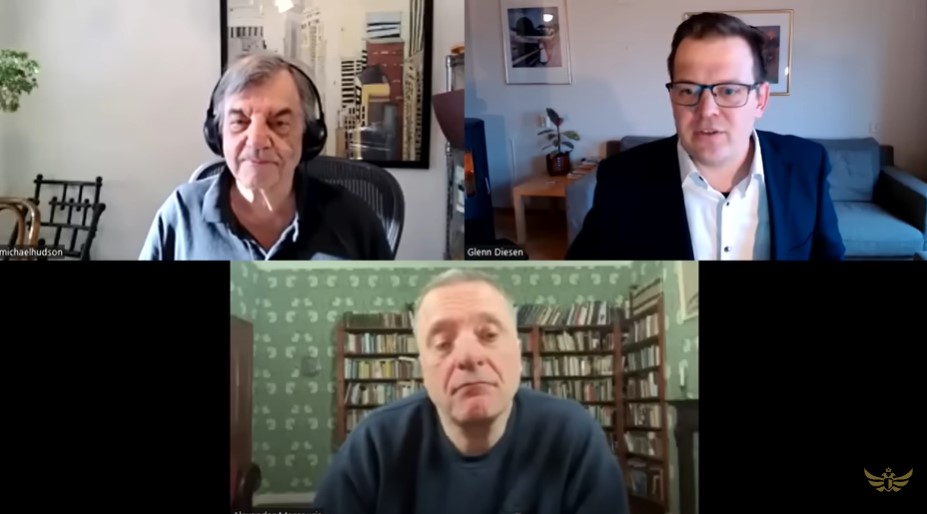视频在线探讨:大英帝国的延续与美国掠夺全球 - 全球经济重构(一)
正文翻译

GLENN DIESEN: Welcome to today’s program. My name is Glenn Diesen. I’m a professor at the University of Southeastern Norway. With me is my colleague Alexander Mercouris from the very informative and popular Duran.
The guest today is none other than the excellent Michael Hudson, a very renowned economist. He’s written brilliant books, which I can’t recommend enough, on on the industrial economy, the financial economy, the process of debt, empire, collapse. So he’s really one of the great economists of our time.
So the reason we really wanted to talk to him today is because we’re living in an age where the world is undergoing tremendous transformation. I would argue that many of the conflicts and wars we currently have have at least some origin in economics. And what has gone wrong, and what will be the new alternatives coming next, is really something we want to explore today, as we see that the main trend of these days appear to be the relative decline of the West, both the United States and Europe. And we also see the rise of the East, especially then with China at the forefront.
格伦(右上):
欢迎来到今天的节目。我叫格伦·迪森。我是挪威东南大学的教授。和我一起的是我的同事亚历山大·迈克瑞斯(下),他来自广受欢迎的Duran频道。
今天的嘉宾不是别人,正是优秀的迈克尔·哈德森,一位非常著名的经济学家。他写了很多精彩的书,我极力推荐,关于工业经济,金融经济,债务的过程,帝国,崩溃。他是我们这个时代最优秀的经济学家之一。
所以我们今天想和他谈谈的原因是因为,我们生活在一个世界正在经历巨大变革的时代。我认为,我们目前所经历的许多冲突和战争至少在一定程度上源于经济学。哪里出了问题,接下来会有什么新的选择,这是我们今天想要探讨的问题,因为我们看到,这些天的主要趋势似乎是西方的相对衰落,包括美国和欧洲。我们也看到了东方的崛起,尤其是中国的崛起。
Often the analysis we’re presented with in the media is often limited to GDP, which doesn’t really help us to understand why the US, for example, have lost its competitiveness, its industrial strength, its ability to compete, especially with the Chinese. And while we tend to refer to the Chinese as, you know, a communist country, it has to be pointed out that to a large extent, they appear to resemble the industrial economy of the United States in the 19th century, that of the, especially the American system, I would say. And we don’t have to limit it to China, it appears that Russia is building a similar economic, well, following a similar economic formula, if you will.
So I wanted to hand it over to Michael Hudson first. And I thought we can start off by explaining, I guess, what signifies this US transition from an industrial economy to a financial economy? And why is this so important to understand in terms of what’s happened with debt and the extension or overextension of empire?
我们在媒体上看到的分析通常仅限于GDP,这并不能真正帮助我们理解为什么美国失去了竞争力,失去了工业实力,失去了竞争能力,尤其是与中国的竞争。虽然我们倾向于把中国称为一个共产主义国家,但必须指出的是,在很大程度上,他们看起来像19世纪美国的工业经济,尤其是美国的体系。我们不必仅限于中国,俄罗斯似乎也在建立类似的经济体系,如果你愿意的话,那就是遵循了类似的经济模式。
所以我想先把它交给迈克尔·哈德森。我想我们可以先解释一下,美国从工业经济向金融经济的转变意味着什么?为什么从债务和帝国扩张或过度扩张的角度理解这一点如此重要?
MICHAEL HUDSON: Well, you said that the United States has lost its competitiveness. And actually, it’s worse, the United States decided it didn’t want to compete. And this goes back to the Clinton administration in the 1990s. The Clinton administration’s obxtive, and that of the Democratic Party, was basically a class war against labor. How do we lower the wages of labor so that we can increase the profitability? Well, the way America had of lowering the wages of labor was, let’s hire Asian labor, especially Chinese labor. Let’s let Chinese into a trade relationship with us into the WTO. And then instead of having to bid up the price of labor in our industrial centers, Detroit and the South and the Midwest, we’ll hire products made by Chinese labor that will keep down wages here. And America can be in a post-industrial economy.
During the 1980s and 90s, all of the economic discussion was, how do you have a post-industrial economy? They didn’t want to industrialize. They thought that industrial labor was blue-collar labor. And in America, you’re not going to have college graduates or even high school graduates wanting to have a blue-collar job. They want a service industry job. They want to make jobs, something that’s not industrial, a managerial job. So a new phrase came into being, the professional managerial class. Technology.
迈克尔·哈德森:
好的,你说美国已经失去了竞争力。实际上,更糟糕的是,美国决定不参加竞争。这要追溯到20世纪90年代的克林顿政府。克林顿政府和民主党的目标基本上是一场针对劳工的阶级战争。
我们怎样才能降低工人的工资来增加利润呢?美国降低劳工工资的方法是,雇佣亚洲劳工,尤其是中国劳工。让中国人加入WTO,让中国与美国建立贸易关系。然后,我们将购买中国劳动力制造的产品,而不是不得不在我们的工业中心,底特律,南部和中西部提高劳动力价格,这将降低这里的工资。美国也可以进入后工业经济。
在20世纪80年代和90年代,所有的经济讨论都是,如何建立一个后工业经济?他们不想工业化。他们认为产业劳动力是蓝领工人。在美国,没有大学毕业生甚至高中毕业生想要从事蓝领工作。他们想要一份服务业的工作。他们想得到一份工作,不是工业方面的工作,而是管理方面的工作。于是就有了一个新词——职业管理阶层,技术层面的说法。
The idea of American economic growth from the 1990s on was, instead of producing manufactured goods, we will develop intellectual property monopolies, especially in information technology, in pharmaceuticals. And America will make its economic growth in GDP, not by making profits to employ labor to produce more and more goods and services, but to have monopoly rents for our pharmaceuticals. So we can make pills that cost 10 cents each and sell them for $500 each. We can make computer programs for automatic artificial intelligence and for computer chips and for all of the information technology we have at enormous markups. And we can live on our economic rents, live off the fat of the land, as they used to say. We don’t have to have blue-collar jobs. Everybody can work in an office and make money that way.
从20世纪90年代开始,美国经济增长的理念是,我们将发展知识产权垄断,而不是生产制成品,尤其是在信息技术和制药领域。美国将通过国内生产总值实现经济增长,不是通过雇佣劳动力生产越来越多的商品和服务来赚取利润,而是通过垄断我们药品获取租金。所以我们可以生产出10美分一片的药片,然后以500美元一片的价格出售。我们可以为自动人工智能、计算机芯片和所有我们拥有的信息技术编写计算机程序,价格都很高。我们可以靠经济租金生活,靠土地的肥肉生活,就像他们过去说的那样。我们不需要蓝领工作。每个人都可以在办公室工作,通过这种方式赚钱。
So in a way, what’s happened today is exactly what America wanted. And all of a sudden, they’ve woken up to the fact and said, how can America run the world and be number one if it doesn’t have a manufacturing power, if it’s dependent on other countries for its manufacturing and now for its technology, and if all of this is financed by running into debt that the economy runs up for the military spending abroad to prevent other countries from competing with the United States, when actually it’s the United States that has decided we want you to compete because your production and competition with us is what’s winning the class war against labor. Your competition is what’s holding down the price of labor. So they haven’t really thought, what does a post-industrial economy mean? Well, it turns out to be a financialized economy.
所以在某种程度上,今天发生的事情正是美国想要的。突然之间,他们意识到了这个事实,他们说,如果它依赖于其他国家的制造业和技术,如果没有制造业,如果所有这些都是通过负债来融资且经济会增加海外军事开支以防止其他国家与美国竞争的话,美国怎么能统治世界,怎么能成为世界第一呢?实际上是美国决定让你们参与竞争,因为你们的生产和与我们的竞争是赢得与劳工的阶级战争的关键。你的竞争压低了劳动力的价格。
所以他们并没有真正思考过,后工业经济意味着什么?这是一个金融化的经济体。
You have today, as the election for 2024 is being prepared, the bewilderment of the Democratic Party here. If you look at the GDP, President Biden says, you’re doing so well, look at GDP. And the vast majority of Americans, according to every poll in every part of the country says, we’re not doing well at all. We’re doing awful. And it turns out that when you look at what is the American GDP, well, almost all of it is the growth in prosperity, the growth in financial benefits for the 1%, maybe for the 10% of the population. And the 1% and the 10% has increased its wealth so much since 2008 led the Federal Reserve to slash interest rates that the 1% and the 10% gain is larger than the loss for the 90%. So all that the President Biden can say is, who are you going to believe? Are you going to look at the statistics or are you going to look at your own life and what you have to spend at the grocery store and what you have to spend on rent and housing as America turns away from a homeowner’s economy into a rental economy?
今天,随着2024年大选的准备,民主党在这里感到困惑。如果你看看GDP,拜登总统说,你们做得很好,看看GDP。根据全国各地的民意调查,绝大多数美国人说,我们做得一点都不好。我们做得很糟糕。
事实证明,当你看美国的GDP时,几乎所有的增长都是繁荣的增长,1%(阶层)的经济利益的增长,也许是10%的人口。自2008年以来,1%和10%的人的财富增长如此之多,导致美联储大幅降息,1%和10%的人的收益大于90%的人的损失。
所以拜登总统能说的就是,你会相信谁? 当美国从房主经济转向租赁经济时,你是要看统计数据,还是看你自己的生活、看你在杂货店花了多少钱、在房租和住房上花了多少钱?
There’s a huge concentration of land and housing in the hands of absentee landlords instead of private homebuyers who now cannot afford to buy a home when the interest rates are soaring to over 7.5%, in which case, if you buy a home with a 10-year mortgage, in only 10 years, the bank makes more money for the mortgage than the seller of the house makes.
So indeed, America has found that, yes, what is the post-industrial economy? It’s a financial economy. And a financial economy has savings on the asset side of the balance sheet and debt on the liability side. But the savings on the asset side are held mainly by the 1%. And the debt on the liability side is owed by the 99%. So when President Biden said, and the economists profession, Paul Krugman and the Nobel Prize winners all say, well, you don’t have to look at debt because we owe it to ourselves. Well, the we who owe it are the 99%. And the ourselves are the 1%. And that’s what is leading the United States to be not a very happy economy these days.
大量的土地和住房集中在不在家的房东手中,而不是私人购房者手中,当利率飙升到7.5%以上时,私人购房者现在买不起房子,在这种情况下,如果你买了一套10年抵押贷款的房子,仅仅10年,银行从抵押贷款中赚的钱就比房子的卖家赚的多。
因此,美国确实发现,是的,什么是后工业经济?这是一个金融经济。金融经济在资产负债表的资产一侧有储蓄,在负债一侧有债务。但资产方面的储蓄主要由1%的人持有,负债这边的债务是99%的人欠的。
所以当拜登总统说,经济学家,保罗·克鲁格曼和诺贝尔奖得主都说,你不需要看债务,因为是我们欠自己的。欠债的“我们”是那99%的人,而“自己”是那1%。这就是导致美国经济最近不太乐观的原因。
ALEXANDER MERCOURIS: What you’ve described to a British ear, and I live in Britain, I’m in London, is not completely unfamiliar. I mean, it’s like the kind of cycle that we went through ourselves in Britain. I mean, you had this system that the British created, basically, in the late 19th century. We have commodities flowing in. I think it was Keynes who talked about how if you were a person of certain affluence in Britain, just before the First World War, you could order things from all over the world and they would come to you. And we had a heavily financialized system. We had the Bank of England, we had the City of London, we had our currency pegged to gold. We insisted that people, to a great extent, trade with our currency. We started to neglect our industrial base and rely increasingly on the profits of our empire. And, you know, the rental systems began to take hold.
亚历山大:
这也是对英国人的描述。我住在英国,我在伦敦,并不完全陌生。我的意思是,这就像我们在英国经历的那种循环。我的意思是,,英国人创建的这套制度,基本上,(创建于)19世纪末。我们有商品流入。
我记得是凯恩斯说过,如果你是英国的富人,就在一战之前,你可以从世界各地订购东西,它们就会送到你手里。我们有一个高度金融化的体系。我们有英格兰银行,我们有伦敦金融城,我们的货币与黄金挂钩。我们坚持让人们在很大程度上用我们的货币进行贸易。我们开始忽视我们的工业基础,越来越依赖我们帝国的利润。你知道,租赁制度开始站稳脚跟。
And one of the things that happened in Britain is that, of course, wealth gradually began to drain upwards. It was like, you know, within the social system you saw some people in late 19th century, early 20th century Britain, becoming incredibly rich and building their houses and buying their Rolls-Royce Silver Ghosts and sending their children to expensive schools and living a very agreeable life. But the rest of the country was going through a time of, shall we say, economic atrophy. And, of course, that happened within a frxwork of empire and a frxwork of imperial control.
And it seems to me that’s one of the big differences with the United States today, is that at least with the British they could control it to some extent because they actually had a proper formal empire. The United States doesn’t have it in exactly the same way. So you are grafting a late imperial British structure without having the mechanics of empire as well defined as the British did. Am I getting this completely wrong?
在英国发生的一件事是,当然,财富逐渐开始向上流失。就像,你知道,在19世纪末20世纪初的英国,你看到一些人变得非常富有,他们建造自己的房子,购买劳斯莱斯银色幽灵,把孩子送到昂贵的学校,过着非常惬意的生活。但是这个国家的其他地方正在经历一段时间,我们可以说是经济萎缩。当然,这一切都是在帝国统治的框架下发生的。
在我看来,这是与今天的美国最大的不同之一,至少与英国人相比,他们可以在某种程度上控制它,因为他们实际上是一个典型的帝国。美国不完全一样,在我看来,它是在嫁接一个晚期的英帝国结构,而没有像英国那样明确定义帝国的机制。我完全搞错了吗?
MICHAEL HUDSON: No, you’ve got the point. The explanation of what happened is that empires don’t pay. If you look at Britain in the 1930s, it certainly was solidifying its empire with imperial preference and India and other countries had to save all their money and England. But all of the money that Britain made from its empire ended up being used to pay the United States. So Britain had a surplus with its empire and a deficit with trade with the United States and with U.S. firms.
So it turned out that already in the 1930s, the United States was the beneficiary of the empire. And, of course, that enabled the United States to write the rules of world trade and the the International Monetary Fund and the British loan in 1944 and 1945 so that England had to basically give up its empire to the United States. It had to end imperial preference. It had to introduce free trade and free investment, which meant that India and the empire could spend all the money that they made during World War II anywhere they wanted. Meaning, where did they want to? Well, the only country that had enough industry to give them what they wanted was the United States.
哈德森:
不,你说对了。对发生的事情的解释是帝国不付钱。如果你看看20世纪30年代的英国,它肯定是在用帝国优先权巩固自己的帝国,印度和其他国家不得不把所有的钱都存在英格兰。但是,英国从其帝国中赚来的所有钱最终都被用来支付给美国。因此,英国对其帝国属地是顺差,而对美国和美国公司是逆差。
所以早在20世纪30年代,美国就已经是帝国的受益者了。当然,这使得美国能够制定世界贸易规则,国际货币基金组织以及1944年和1945年的英国贷款,因此英国基本上不得不将其帝国拱手让给美国。它必须结束帝国的优惠政策。它必须引入自由贸易和自由投资,这意味着印度和帝国可以把他们在第二次世界大战期间赚到的钱花在任何他们想要的地方。这意味着,他们想去哪里?唯一一个有足够工业满足他们需求的国家就是美国。
Well, the United States is going through what England went through today. The empire really didn’t pay. And starting with the Korean War in 1951, the United States moved from a position where it started in 1950 with 75 percent of the world’s gold held in the United States. The Korean War pushed the United States into chronic balance of payments deficit. And I’ve done the statistics that I’ve published in Super Imperialism, and the entire American balance of payments deficit was military spending abroad to protect the empire. The private sector in America was just exactly in balance. Trade, foreign investment, borrowing, tourism, all of that was balanced. The entire deficit was military spending, and it felt to lock in the empire. Well, you’re seeing that today accelerating.
美国正在经历今天英国所经历的事情。帝国真的没有付钱。从1951年的朝鲜战争开始之前,美国的黄金储备从1950年开始的就占全球的75%,朝鲜战争使美国陷入长期的国际收支逆差。
我在《超级帝国主义》中发表了统计数据,美国的国际收支赤字全部是为了保护帝国而在海外的军事开支。美国的私营部门刚好处于平衡状态。贸易,外国投资,借贷,旅游,所有这些都是平衡的。所有的赤字都是军事开支,它似乎锁定了帝国。并且,你今天看到的是(军事开支的)加速增长。
And the problem is, how can America finance the military spending abroad? Well, ironically, what happened was the military spending in Vietnam and Southeast Asia forced America off the gold standard, as you know, in 1971. And what were foreign central banks going to do with all of the dollars that were flowing in? They weren’t going to do what General De Gaulle and Germany were doing in buying gold. All they could do was say, well, we have to invest our money in securities. We’ll buy U.S. Treasury securities. And so all the money that America spent abroad militarily was sent back to the United States by the central banks of Europe and other payment surplus countries to finance the balance of payments deficit for the war. So in effect, the whole international monetary system was based on IOUs for America’s military spending across the world.
问题是,美国是如何为海外军事开支提供资金?讽刺的是,1971年,越南和东南亚的军费开支迫使美国放弃了金本位制。外国央行会如何处理流入的美元呢? 他们不会像戴高乐将军和德国那样购买黄金。他们所能做的就是说,我们必须把钱投资于证券。我们将购买美国国债。因此,美国在海外花费的所有资金都被欧洲和其他国际收支顺差国家的中央银行汇回美国,为战争的国际收支赤字提供资金。因此,实际上,整个国际货币体系是建立在美国在世界各地军费开支的借条基础上的。
Well, you can imagine what’s happened today now that the United States has taken a very belligerent position in the world, saying it’s our way or we’re just going to smash things up. The United States, this system, has split the world into two opposing camps, as I think you’ve said on this show. I watch your show regularly, and this is what you’ve been talking about week after week after week, how the world is dividing up and what are the dynamics of this. That’s what you’ve been talking about.
Obviously, other countries think that it’s sort of a crazy international financial system when they’re being threatened by America’s military adventurism of China in the Near East and all over the world. Shouldn’t they have a system that doesn’t rely on the dollar and relies on their own mutual trade and investment? That’s what’s changing the whole world economy today.
你可以想象今天发生了什么。现在美国在世界上采取了非常好战的立场,说这是我们的要求,否则我们就会把事情搞砸。美国,这套体制,已经把世界分裂成两个对立的阵营,我想你在这个节目中说过。我经常看你的节目,这就是你一周又一周一直在谈论的事情,世界是如何分裂的,这其中的动力是什么。这就是你一直在说的。
显然,其他国家认为这是一种疯狂的国际金融体系,当他们受到美国在近东和世界各地包括中国周边军事冒险主义的威胁时。难道他们不应该建立一个不依赖美元,而依赖于他们自己的相互贸易和投资的体系吗?这就是今天正在改变整个世界经济的东西。
(未完待续)

GLENN DIESEN: Welcome to today’s program. My name is Glenn Diesen. I’m a professor at the University of Southeastern Norway. With me is my colleague Alexander Mercouris from the very informative and popular Duran.
The guest today is none other than the excellent Michael Hudson, a very renowned economist. He’s written brilliant books, which I can’t recommend enough, on on the industrial economy, the financial economy, the process of debt, empire, collapse. So he’s really one of the great economists of our time.
So the reason we really wanted to talk to him today is because we’re living in an age where the world is undergoing tremendous transformation. I would argue that many of the conflicts and wars we currently have have at least some origin in economics. And what has gone wrong, and what will be the new alternatives coming next, is really something we want to explore today, as we see that the main trend of these days appear to be the relative decline of the West, both the United States and Europe. And we also see the rise of the East, especially then with China at the forefront.
格伦(右上):
欢迎来到今天的节目。我叫格伦·迪森。我是挪威东南大学的教授。和我一起的是我的同事亚历山大·迈克瑞斯(下),他来自广受欢迎的Duran频道。
今天的嘉宾不是别人,正是优秀的迈克尔·哈德森,一位非常著名的经济学家。他写了很多精彩的书,我极力推荐,关于工业经济,金融经济,债务的过程,帝国,崩溃。他是我们这个时代最优秀的经济学家之一。
所以我们今天想和他谈谈的原因是因为,我们生活在一个世界正在经历巨大变革的时代。我认为,我们目前所经历的许多冲突和战争至少在一定程度上源于经济学。哪里出了问题,接下来会有什么新的选择,这是我们今天想要探讨的问题,因为我们看到,这些天的主要趋势似乎是西方的相对衰落,包括美国和欧洲。我们也看到了东方的崛起,尤其是中国的崛起。
Often the analysis we’re presented with in the media is often limited to GDP, which doesn’t really help us to understand why the US, for example, have lost its competitiveness, its industrial strength, its ability to compete, especially with the Chinese. And while we tend to refer to the Chinese as, you know, a communist country, it has to be pointed out that to a large extent, they appear to resemble the industrial economy of the United States in the 19th century, that of the, especially the American system, I would say. And we don’t have to limit it to China, it appears that Russia is building a similar economic, well, following a similar economic formula, if you will.
So I wanted to hand it over to Michael Hudson first. And I thought we can start off by explaining, I guess, what signifies this US transition from an industrial economy to a financial economy? And why is this so important to understand in terms of what’s happened with debt and the extension or overextension of empire?
我们在媒体上看到的分析通常仅限于GDP,这并不能真正帮助我们理解为什么美国失去了竞争力,失去了工业实力,失去了竞争能力,尤其是与中国的竞争。虽然我们倾向于把中国称为一个共产主义国家,但必须指出的是,在很大程度上,他们看起来像19世纪美国的工业经济,尤其是美国的体系。我们不必仅限于中国,俄罗斯似乎也在建立类似的经济体系,如果你愿意的话,那就是遵循了类似的经济模式。
所以我想先把它交给迈克尔·哈德森。我想我们可以先解释一下,美国从工业经济向金融经济的转变意味着什么?为什么从债务和帝国扩张或过度扩张的角度理解这一点如此重要?
MICHAEL HUDSON: Well, you said that the United States has lost its competitiveness. And actually, it’s worse, the United States decided it didn’t want to compete. And this goes back to the Clinton administration in the 1990s. The Clinton administration’s obxtive, and that of the Democratic Party, was basically a class war against labor. How do we lower the wages of labor so that we can increase the profitability? Well, the way America had of lowering the wages of labor was, let’s hire Asian labor, especially Chinese labor. Let’s let Chinese into a trade relationship with us into the WTO. And then instead of having to bid up the price of labor in our industrial centers, Detroit and the South and the Midwest, we’ll hire products made by Chinese labor that will keep down wages here. And America can be in a post-industrial economy.
During the 1980s and 90s, all of the economic discussion was, how do you have a post-industrial economy? They didn’t want to industrialize. They thought that industrial labor was blue-collar labor. And in America, you’re not going to have college graduates or even high school graduates wanting to have a blue-collar job. They want a service industry job. They want to make jobs, something that’s not industrial, a managerial job. So a new phrase came into being, the professional managerial class. Technology.
迈克尔·哈德森:
好的,你说美国已经失去了竞争力。实际上,更糟糕的是,美国决定不参加竞争。这要追溯到20世纪90年代的克林顿政府。克林顿政府和民主党的目标基本上是一场针对劳工的阶级战争。
我们怎样才能降低工人的工资来增加利润呢?美国降低劳工工资的方法是,雇佣亚洲劳工,尤其是中国劳工。让中国人加入WTO,让中国与美国建立贸易关系。然后,我们将购买中国劳动力制造的产品,而不是不得不在我们的工业中心,底特律,南部和中西部提高劳动力价格,这将降低这里的工资。美国也可以进入后工业经济。
在20世纪80年代和90年代,所有的经济讨论都是,如何建立一个后工业经济?他们不想工业化。他们认为产业劳动力是蓝领工人。在美国,没有大学毕业生甚至高中毕业生想要从事蓝领工作。他们想要一份服务业的工作。他们想得到一份工作,不是工业方面的工作,而是管理方面的工作。于是就有了一个新词——职业管理阶层,技术层面的说法。
The idea of American economic growth from the 1990s on was, instead of producing manufactured goods, we will develop intellectual property monopolies, especially in information technology, in pharmaceuticals. And America will make its economic growth in GDP, not by making profits to employ labor to produce more and more goods and services, but to have monopoly rents for our pharmaceuticals. So we can make pills that cost 10 cents each and sell them for $500 each. We can make computer programs for automatic artificial intelligence and for computer chips and for all of the information technology we have at enormous markups. And we can live on our economic rents, live off the fat of the land, as they used to say. We don’t have to have blue-collar jobs. Everybody can work in an office and make money that way.
从20世纪90年代开始,美国经济增长的理念是,我们将发展知识产权垄断,而不是生产制成品,尤其是在信息技术和制药领域。美国将通过国内生产总值实现经济增长,不是通过雇佣劳动力生产越来越多的商品和服务来赚取利润,而是通过垄断我们药品获取租金。所以我们可以生产出10美分一片的药片,然后以500美元一片的价格出售。我们可以为自动人工智能、计算机芯片和所有我们拥有的信息技术编写计算机程序,价格都很高。我们可以靠经济租金生活,靠土地的肥肉生活,就像他们过去说的那样。我们不需要蓝领工作。每个人都可以在办公室工作,通过这种方式赚钱。
So in a way, what’s happened today is exactly what America wanted. And all of a sudden, they’ve woken up to the fact and said, how can America run the world and be number one if it doesn’t have a manufacturing power, if it’s dependent on other countries for its manufacturing and now for its technology, and if all of this is financed by running into debt that the economy runs up for the military spending abroad to prevent other countries from competing with the United States, when actually it’s the United States that has decided we want you to compete because your production and competition with us is what’s winning the class war against labor. Your competition is what’s holding down the price of labor. So they haven’t really thought, what does a post-industrial economy mean? Well, it turns out to be a financialized economy.
所以在某种程度上,今天发生的事情正是美国想要的。突然之间,他们意识到了这个事实,他们说,如果它依赖于其他国家的制造业和技术,如果没有制造业,如果所有这些都是通过负债来融资且经济会增加海外军事开支以防止其他国家与美国竞争的话,美国怎么能统治世界,怎么能成为世界第一呢?实际上是美国决定让你们参与竞争,因为你们的生产和与我们的竞争是赢得与劳工的阶级战争的关键。你的竞争压低了劳动力的价格。
所以他们并没有真正思考过,后工业经济意味着什么?这是一个金融化的经济体。
You have today, as the election for 2024 is being prepared, the bewilderment of the Democratic Party here. If you look at the GDP, President Biden says, you’re doing so well, look at GDP. And the vast majority of Americans, according to every poll in every part of the country says, we’re not doing well at all. We’re doing awful. And it turns out that when you look at what is the American GDP, well, almost all of it is the growth in prosperity, the growth in financial benefits for the 1%, maybe for the 10% of the population. And the 1% and the 10% has increased its wealth so much since 2008 led the Federal Reserve to slash interest rates that the 1% and the 10% gain is larger than the loss for the 90%. So all that the President Biden can say is, who are you going to believe? Are you going to look at the statistics or are you going to look at your own life and what you have to spend at the grocery store and what you have to spend on rent and housing as America turns away from a homeowner’s economy into a rental economy?
今天,随着2024年大选的准备,民主党在这里感到困惑。如果你看看GDP,拜登总统说,你们做得很好,看看GDP。根据全国各地的民意调查,绝大多数美国人说,我们做得一点都不好。我们做得很糟糕。
事实证明,当你看美国的GDP时,几乎所有的增长都是繁荣的增长,1%(阶层)的经济利益的增长,也许是10%的人口。自2008年以来,1%和10%的人的财富增长如此之多,导致美联储大幅降息,1%和10%的人的收益大于90%的人的损失。
所以拜登总统能说的就是,你会相信谁? 当美国从房主经济转向租赁经济时,你是要看统计数据,还是看你自己的生活、看你在杂货店花了多少钱、在房租和住房上花了多少钱?
There’s a huge concentration of land and housing in the hands of absentee landlords instead of private homebuyers who now cannot afford to buy a home when the interest rates are soaring to over 7.5%, in which case, if you buy a home with a 10-year mortgage, in only 10 years, the bank makes more money for the mortgage than the seller of the house makes.
So indeed, America has found that, yes, what is the post-industrial economy? It’s a financial economy. And a financial economy has savings on the asset side of the balance sheet and debt on the liability side. But the savings on the asset side are held mainly by the 1%. And the debt on the liability side is owed by the 99%. So when President Biden said, and the economists profession, Paul Krugman and the Nobel Prize winners all say, well, you don’t have to look at debt because we owe it to ourselves. Well, the we who owe it are the 99%. And the ourselves are the 1%. And that’s what is leading the United States to be not a very happy economy these days.
大量的土地和住房集中在不在家的房东手中,而不是私人购房者手中,当利率飙升到7.5%以上时,私人购房者现在买不起房子,在这种情况下,如果你买了一套10年抵押贷款的房子,仅仅10年,银行从抵押贷款中赚的钱就比房子的卖家赚的多。
因此,美国确实发现,是的,什么是后工业经济?这是一个金融经济。金融经济在资产负债表的资产一侧有储蓄,在负债一侧有债务。但资产方面的储蓄主要由1%的人持有,负债这边的债务是99%的人欠的。
所以当拜登总统说,经济学家,保罗·克鲁格曼和诺贝尔奖得主都说,你不需要看债务,因为是我们欠自己的。欠债的“我们”是那99%的人,而“自己”是那1%。这就是导致美国经济最近不太乐观的原因。
ALEXANDER MERCOURIS: What you’ve described to a British ear, and I live in Britain, I’m in London, is not completely unfamiliar. I mean, it’s like the kind of cycle that we went through ourselves in Britain. I mean, you had this system that the British created, basically, in the late 19th century. We have commodities flowing in. I think it was Keynes who talked about how if you were a person of certain affluence in Britain, just before the First World War, you could order things from all over the world and they would come to you. And we had a heavily financialized system. We had the Bank of England, we had the City of London, we had our currency pegged to gold. We insisted that people, to a great extent, trade with our currency. We started to neglect our industrial base and rely increasingly on the profits of our empire. And, you know, the rental systems began to take hold.
亚历山大:
这也是对英国人的描述。我住在英国,我在伦敦,并不完全陌生。我的意思是,这就像我们在英国经历的那种循环。我的意思是,,英国人创建的这套制度,基本上,(创建于)19世纪末。我们有商品流入。
我记得是凯恩斯说过,如果你是英国的富人,就在一战之前,你可以从世界各地订购东西,它们就会送到你手里。我们有一个高度金融化的体系。我们有英格兰银行,我们有伦敦金融城,我们的货币与黄金挂钩。我们坚持让人们在很大程度上用我们的货币进行贸易。我们开始忽视我们的工业基础,越来越依赖我们帝国的利润。你知道,租赁制度开始站稳脚跟。
And one of the things that happened in Britain is that, of course, wealth gradually began to drain upwards. It was like, you know, within the social system you saw some people in late 19th century, early 20th century Britain, becoming incredibly rich and building their houses and buying their Rolls-Royce Silver Ghosts and sending their children to expensive schools and living a very agreeable life. But the rest of the country was going through a time of, shall we say, economic atrophy. And, of course, that happened within a frxwork of empire and a frxwork of imperial control.
And it seems to me that’s one of the big differences with the United States today, is that at least with the British they could control it to some extent because they actually had a proper formal empire. The United States doesn’t have it in exactly the same way. So you are grafting a late imperial British structure without having the mechanics of empire as well defined as the British did. Am I getting this completely wrong?
在英国发生的一件事是,当然,财富逐渐开始向上流失。就像,你知道,在19世纪末20世纪初的英国,你看到一些人变得非常富有,他们建造自己的房子,购买劳斯莱斯银色幽灵,把孩子送到昂贵的学校,过着非常惬意的生活。但是这个国家的其他地方正在经历一段时间,我们可以说是经济萎缩。当然,这一切都是在帝国统治的框架下发生的。
在我看来,这是与今天的美国最大的不同之一,至少与英国人相比,他们可以在某种程度上控制它,因为他们实际上是一个典型的帝国。美国不完全一样,在我看来,它是在嫁接一个晚期的英帝国结构,而没有像英国那样明确定义帝国的机制。我完全搞错了吗?
MICHAEL HUDSON: No, you’ve got the point. The explanation of what happened is that empires don’t pay. If you look at Britain in the 1930s, it certainly was solidifying its empire with imperial preference and India and other countries had to save all their money and England. But all of the money that Britain made from its empire ended up being used to pay the United States. So Britain had a surplus with its empire and a deficit with trade with the United States and with U.S. firms.
So it turned out that already in the 1930s, the United States was the beneficiary of the empire. And, of course, that enabled the United States to write the rules of world trade and the the International Monetary Fund and the British loan in 1944 and 1945 so that England had to basically give up its empire to the United States. It had to end imperial preference. It had to introduce free trade and free investment, which meant that India and the empire could spend all the money that they made during World War II anywhere they wanted. Meaning, where did they want to? Well, the only country that had enough industry to give them what they wanted was the United States.
哈德森:
不,你说对了。对发生的事情的解释是帝国不付钱。如果你看看20世纪30年代的英国,它肯定是在用帝国优先权巩固自己的帝国,印度和其他国家不得不把所有的钱都存在英格兰。但是,英国从其帝国中赚来的所有钱最终都被用来支付给美国。因此,英国对其帝国属地是顺差,而对美国和美国公司是逆差。
所以早在20世纪30年代,美国就已经是帝国的受益者了。当然,这使得美国能够制定世界贸易规则,国际货币基金组织以及1944年和1945年的英国贷款,因此英国基本上不得不将其帝国拱手让给美国。它必须结束帝国的优惠政策。它必须引入自由贸易和自由投资,这意味着印度和帝国可以把他们在第二次世界大战期间赚到的钱花在任何他们想要的地方。这意味着,他们想去哪里?唯一一个有足够工业满足他们需求的国家就是美国。
Well, the United States is going through what England went through today. The empire really didn’t pay. And starting with the Korean War in 1951, the United States moved from a position where it started in 1950 with 75 percent of the world’s gold held in the United States. The Korean War pushed the United States into chronic balance of payments deficit. And I’ve done the statistics that I’ve published in Super Imperialism, and the entire American balance of payments deficit was military spending abroad to protect the empire. The private sector in America was just exactly in balance. Trade, foreign investment, borrowing, tourism, all of that was balanced. The entire deficit was military spending, and it felt to lock in the empire. Well, you’re seeing that today accelerating.
美国正在经历今天英国所经历的事情。帝国真的没有付钱。从1951年的朝鲜战争开始之前,美国的黄金储备从1950年开始的就占全球的75%,朝鲜战争使美国陷入长期的国际收支逆差。
我在《超级帝国主义》中发表了统计数据,美国的国际收支赤字全部是为了保护帝国而在海外的军事开支。美国的私营部门刚好处于平衡状态。贸易,外国投资,借贷,旅游,所有这些都是平衡的。所有的赤字都是军事开支,它似乎锁定了帝国。并且,你今天看到的是(军事开支的)加速增长。
And the problem is, how can America finance the military spending abroad? Well, ironically, what happened was the military spending in Vietnam and Southeast Asia forced America off the gold standard, as you know, in 1971. And what were foreign central banks going to do with all of the dollars that were flowing in? They weren’t going to do what General De Gaulle and Germany were doing in buying gold. All they could do was say, well, we have to invest our money in securities. We’ll buy U.S. Treasury securities. And so all the money that America spent abroad militarily was sent back to the United States by the central banks of Europe and other payment surplus countries to finance the balance of payments deficit for the war. So in effect, the whole international monetary system was based on IOUs for America’s military spending across the world.
问题是,美国是如何为海外军事开支提供资金?讽刺的是,1971年,越南和东南亚的军费开支迫使美国放弃了金本位制。外国央行会如何处理流入的美元呢? 他们不会像戴高乐将军和德国那样购买黄金。他们所能做的就是说,我们必须把钱投资于证券。我们将购买美国国债。因此,美国在海外花费的所有资金都被欧洲和其他国际收支顺差国家的中央银行汇回美国,为战争的国际收支赤字提供资金。因此,实际上,整个国际货币体系是建立在美国在世界各地军费开支的借条基础上的。
Well, you can imagine what’s happened today now that the United States has taken a very belligerent position in the world, saying it’s our way or we’re just going to smash things up. The United States, this system, has split the world into two opposing camps, as I think you’ve said on this show. I watch your show regularly, and this is what you’ve been talking about week after week after week, how the world is dividing up and what are the dynamics of this. That’s what you’ve been talking about.
Obviously, other countries think that it’s sort of a crazy international financial system when they’re being threatened by America’s military adventurism of China in the Near East and all over the world. Shouldn’t they have a system that doesn’t rely on the dollar and relies on their own mutual trade and investment? That’s what’s changing the whole world economy today.
你可以想象今天发生了什么。现在美国在世界上采取了非常好战的立场,说这是我们的要求,否则我们就会把事情搞砸。美国,这套体制,已经把世界分裂成两个对立的阵营,我想你在这个节目中说过。我经常看你的节目,这就是你一周又一周一直在谈论的事情,世界是如何分裂的,这其中的动力是什么。这就是你一直在说的。
显然,其他国家认为这是一种疯狂的国际金融体系,当他们受到美国在近东和世界各地包括中国周边军事冒险主义的威胁时。难道他们不应该建立一个不依赖美元,而依赖于他们自己的相互贸易和投资的体系吗?这就是今天正在改变整个世界经济的东西。
(未完待续)
评论翻译
(见末篇)






